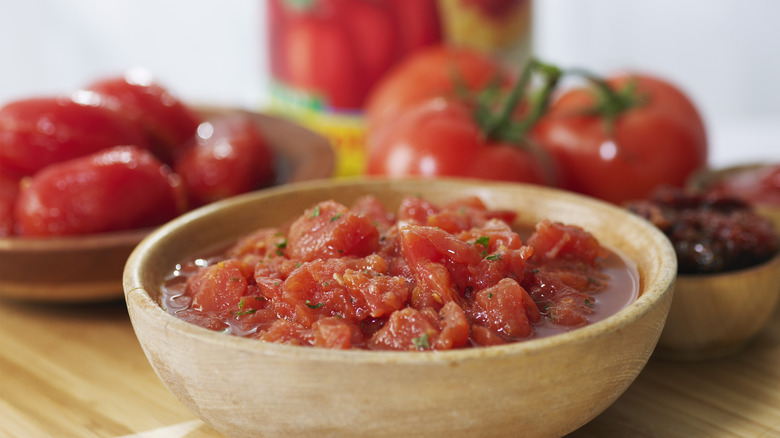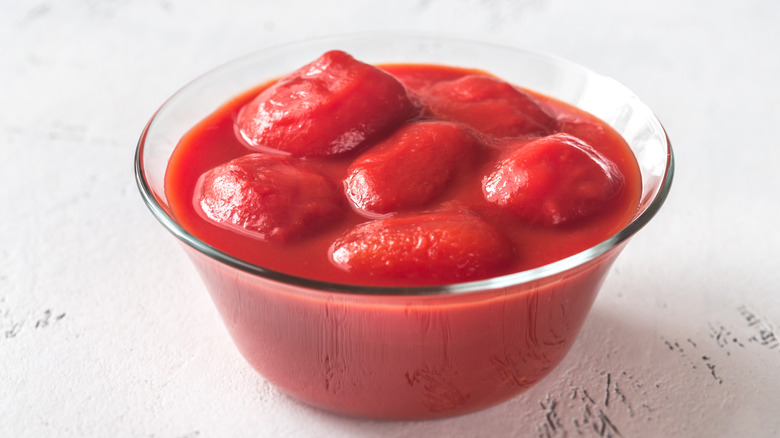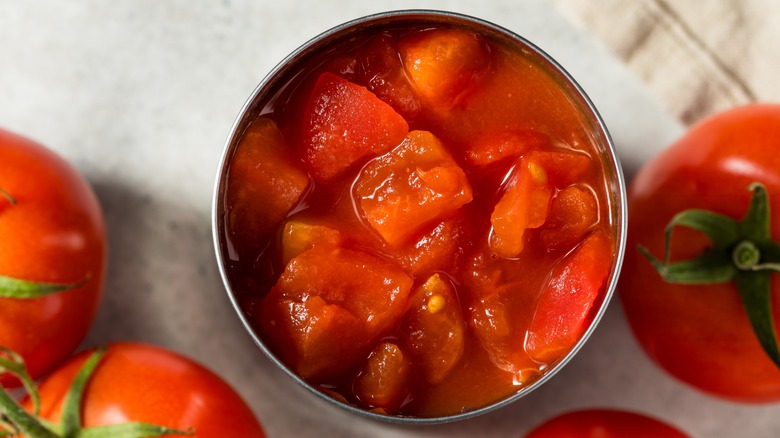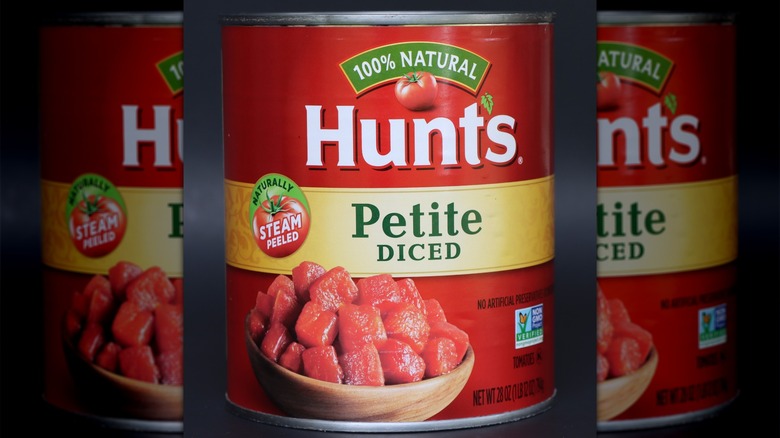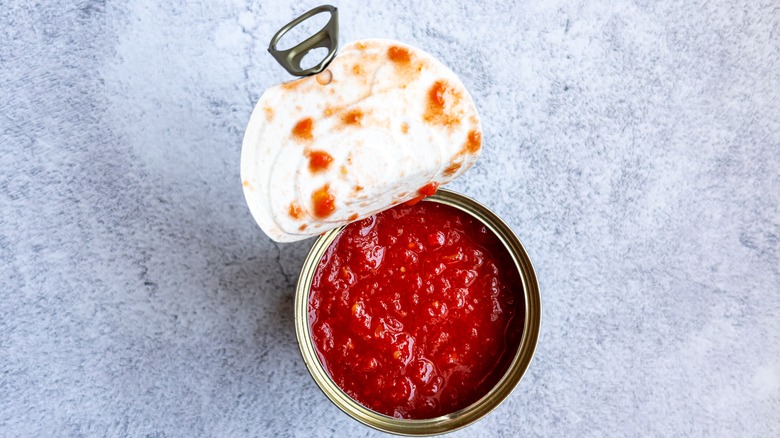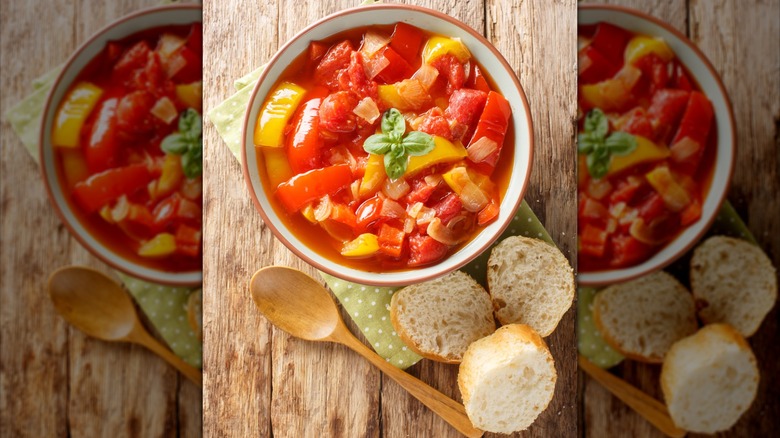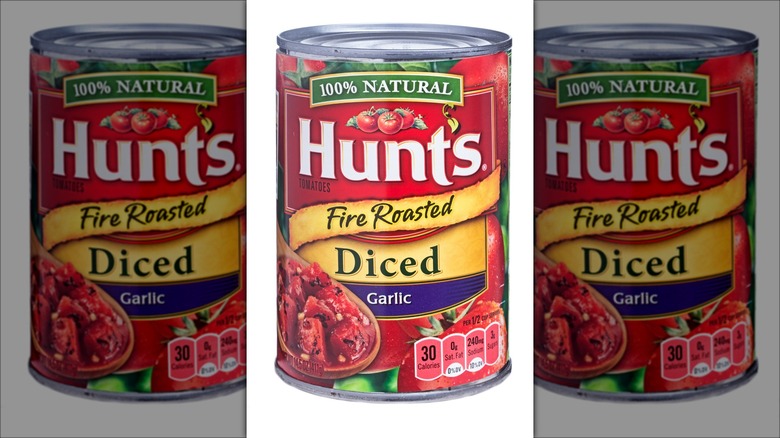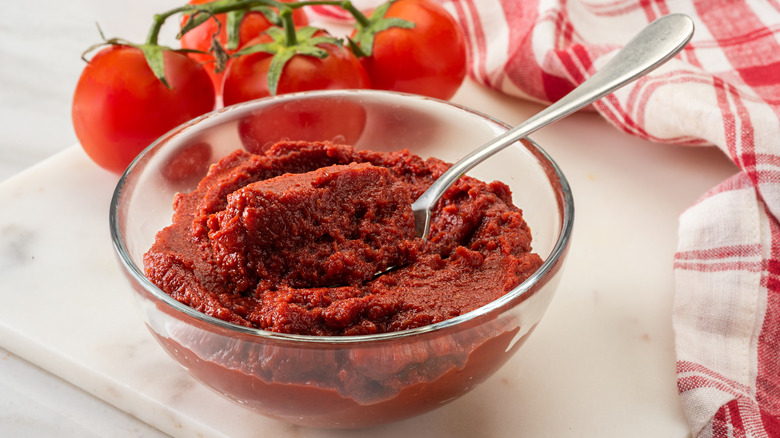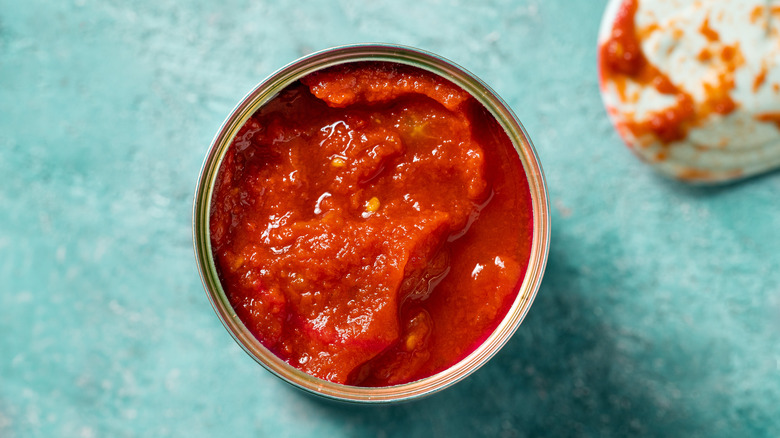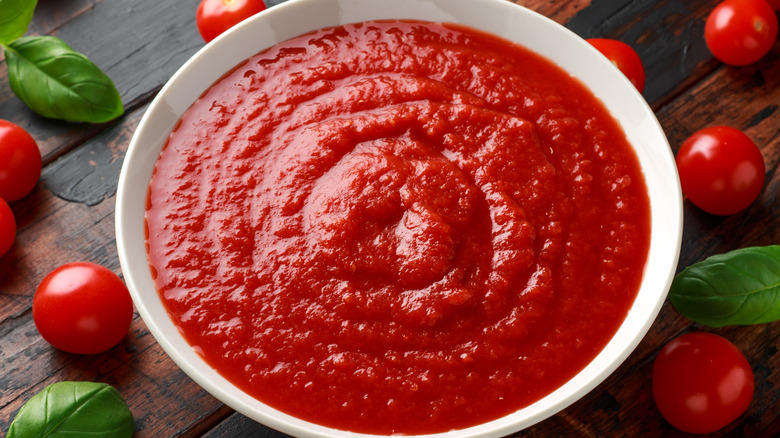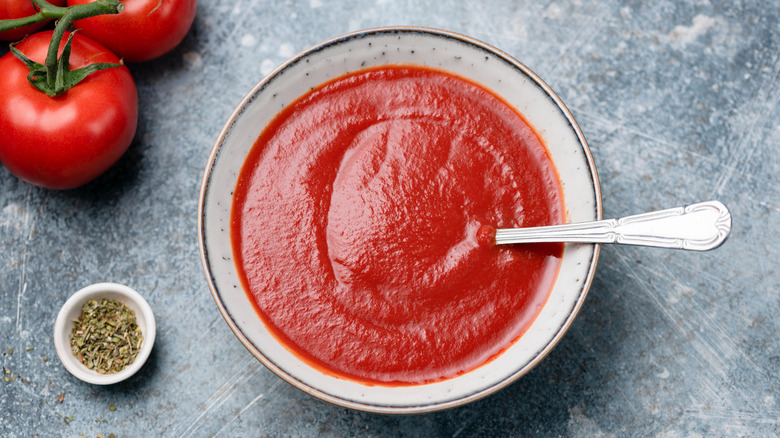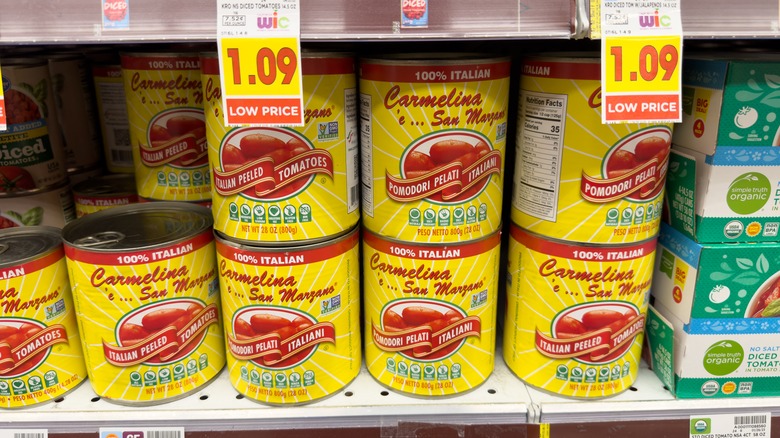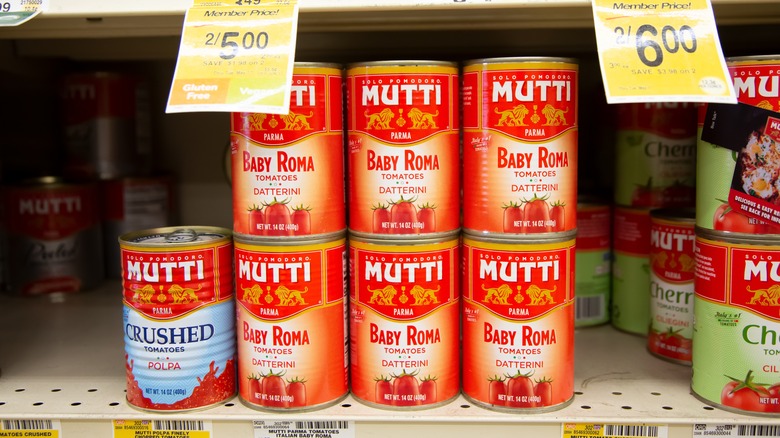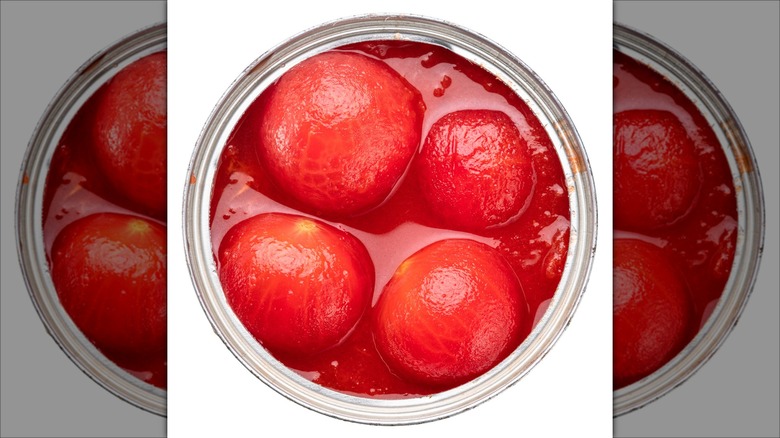13 Types Of Canned Tomatoes And How To Use Them, According To The Pros
You'll find canned tomatoes in practically every kitchen belonging to someone who cooks from scratch even semi-regularly. They're such common ingredients, but many of us don't pay much attention to them, picking up whichever type and brand we first lay our hands on at the store. To improve your kitchen prowess, you should be learning all about the types of canned tomatoes and how to use them. Knowing which variety is the best for the task at hand can level up your recipes.
I used to make pizza semi-professionally, so I've been up to my eyeballs in canned tomatoes. And, coming from an Italian family, I pride myself on knowing which ones are worth buying. However, I still wanted to learn more from those in-the-know, so I interviewed two professional chefs and a recipe developer to find out everything there is to know about canned tomatoes and other canned tomato products. Once you've learned all about them and how to use them, it can only improve your skills in the kitchen.
Whole tomatoes
Whole plum tomatoes are commonly found in grocery stores, but many people aren't sure what they're used for or what to do with them. You might wonder when you're going to need whole tomatoes in a dish. The thing is, they're usually not used whole and are more versatile than you might imagine. You can crush or mash them, as needed, and they break down during cooking.
"Whole peeled tomatoes serve as a wonderful starting point for your journey with canned tomatoes," says chef Mike Friedman, owner of Washington D.C. eateries The Red Hen, All-Purpose, Aventino, AP Pizza Shop, and Fossette Focacceria. "The tomatoes can be puréed to a sauce or hand-crushed for a more artisanal texture." I always use whole tomatoes as a go-to for pizza and pasta sauces, as the tomatoes tend to be of a better quality overall and I can control the texture better. Chef Troy Guard of TAG Restaurant Group agrees that they're a versatile choice and "great for chunky pasta sauces, hearty soups, stews, or tomato bisque."
But, these aren't the only ways to use them. "You can also remove the whole peeled tomatoes to roast for a deeper, more caramelized flavor profile," Friedman suggests. "The tomato juice can be strained and reduced to a tomato paste or reserved for your next Bloody Mary party," he adds. For many, whole canned tomatoes are just superior to other varieties.
Diced tomatoes
Diced tomatoes are a common ingredient in all kinds of recipes, but they might not be the best choice. To decide whether they're right for you and the dishes you're making, you'll need to learn more about them. "Diced tomatoes are a canned product where whole peeled tomatoes are simply cut into small uniform pieces," explains chef Mike Friedman. "This allows you to skip the step of doing it yourself." He notes that they're good for dishes where you want that texture, such as stuffed peppers or a Texas-style chili.
"This type of canned tomato does not break down so you only want to use it if you are OK with seeing diced tomatoes in the final product," says recipe developer and food blogger Melissa O'Leary of Keeping It Simple. And, therein lies the problem. What you might not know about canned diced tomatoes is that they contain an additive called calcium chloride. The purpose of this is to help the tomatoes keep their shape, but this makes them somewhat hard and keeps them from fully breaking down. So, if you're looking for a velvety smooth sauce, they're not the best option. Of course, not every brand is equal, so if you know how to find high-quality canned tomatoes, you might have more luck with them.
Petite diced tomatoes
You've probably used diced tomatoes, but what about the lesser-known petite diced alternative? "The petite diced version offers a smaller version of the regular diced variety," notes Mike Friedman, chef-owner of The Red Hen and more. Recipe developer Melissa O'Leary backs this up, explaining that "petite diced tomatoes are a smaller dice than the regular diced tomatoes (and a bit newer to the market)." She says, "I like the petite diced more than regular diced tomatoes since I prefer smaller bits of tomatoes in my dishes."
Petite diced varieties suffer from the same issues as diced tomatoes. The added calcium chloride keeps them from fully breaking down. This is fine if you'd like chunks of tomatoes in your finished dish, but often what people want from a tomato-based dish is a uniform texture with the tomatoes broken down into a sauce. Still, with their smaller dice, these tomatoes are less obvious in a dish.
Crushed tomatoes
Crushed tomatoes are essentially similar to whole canned tomatoes but already crushed. They "tend to melt better into sauces and braises, giving the feeling that an Italian grandmother helped craft the dish," explains chef Mike Friedman. "They are great for adding thickness to dishes," notes Troy Guard of TAG Restaurant Group. It makes it faster to cook sauces and other dishes because the tomatoes are already partially broken down. That's why crushed tomatoes are perfect for a quick marinara sauce.
However, food blogger Melissa O'Leary says, "Many Italians like myself prefer to buy the whole tomatoes because we want to see the tomato and make sure it looks nice and ripe without any tough ends." That said, she adds that "if you do not mind not knowing this, and do not feel like mashing down whole tomatoes, this is the canned tomato for you."
The other potential problem is that crushed tomatoes isn't a regulated term. Some crushed tomatoes are so smooth that they're basically a purée, while others are super chunky. Most fall somewhere in the middle, though, with some texture but not too much. It's fine if you have a canned tomato brand you already know and love and you're aware of the texture of their crushed offerings, but otherwise it can be a bit of a wildcard.
Stewed tomatoes
Now that we've gone through the main types of tomatoes that you might find on a grocery store shelf — whole, crushed, and diced — what about the cans of stewed tomatoes you occasionally run into? What's the deal with those and how should you be using them? Luckily, the experts I spoke to were able to shed some light on it.
"Stewed tomatoes have been simmered with seasonings like onions, celery, and bell peppers before canning," Troy Guard explains. "They are perfect for at-home cooks who want to get a head start on adding flavor to soups, stews, or casseroles." So, rather than starting completely from scratch with your aromatics, seasonings, and a separate can of tomatoes, stewed tomatoes are already partially cooked with aromatics added. This means you have less work to do making a dish flavorful, so it's quicker to get a meal on the table. They're particularly good for simple weeknight meals.
What you need to contend with is that all stewed tomatoes will be slightly different. Some contain onions, celery, carrots, garlic, and herbs; others just onions or onions and celery. It varies widely from brand to brand, so you'll have to check the ingredients to know exactly what you're getting and whether it will work with the recipe you have in mind.
Fire roasted tomatoes
As the name suggests, fire roasted tomatoes are roasted over flames before being canned, bringing extra flavor to the table. "Fire roasted tomatoes have been gently roasted over an open fire, giving you a slightly caramelized flavor with a distinct smokiness," says chef Mike Friedman. If you love adding smoky notes to your dishes, they're a perfect addition.
But, where and how should you use them? "These are great for any Latin-inspired dish (an extra smoky kick) or in omelettes to add depth of flavor," Friedman suggests. "Be wary," he adds. "Fire roasted tomatoes add a distinct flavor or smoke — if that's what is expected, then you know what you're getting." This makes them a less versatile option and not suitable for every recipe, but they can elevate dishes.
Not everyone is a huge fan, though. "I do not use these often since I find the flavor to be very overpowering," says Melissa O'Leary of Keeping It Simple. We think they're definitely worth trying, but they can be a divisive ingredient, with some folks liking them in pretty much everything and others preferring them in specific dishes or not at all. It's also worth noting fire roasted tomatoes can be whole or diced and often come with other flavorful ingredients, such as garlic and chili.
Tomato paste
Tomato paste is more of a canned tomato product than canned tomatoes, as such, but it's a useful ingredient, so we think it's one worth learning more about. "This is the thickest of all the canned tomato products and the most misunderstood one in my opinion," says Melissa O'Leary. She explains that it's made from whole tomatoes that have been heated, strained, and reduced to a thick paste.
"Tomato paste is extremely versatile," she says, noting that it's a great thickener for all kinds of tomato sauces. "Most Italians who make their all day sauce with whole canned tomatoes will add 1 to 2 tablespoons of tomato paste too to help thicken the consistency of the sauce." It's highly concentrated, so it adds a burst of tomato flavor, too.
O'Leary tells us you can also add it to pan sauce with some water. "If I am out of diced tomatoes and need tomatoes for an addition to a recipe, I will mix some tomato paste with water and use this as a substitute," she says. You can buy it either in a can or in a tube with a screw cap. The tube version makes it easier to save what you don't use in one go.
Tomato sauce
Tomato sauce is another canned tomato product that can be a little baffling. That's because it isn't exactly the same brand to brand. "It is the consistency of a smooth sauce and less thick than a tomato purée," explains recipe developer Melissa O'Leary. "This type of canned tomato comes in many varieties and is often already seasoned," she adds. However, it isn't always seasoned, so you need to check the particular can that you're buying.
"Tomato sauce is smooth and ready to use, making it great for pasta dishes," says chef Troy Guard. "Right now, our top seller at Guard and Grace in Houston is our smoked salmon with an incredible smoked tomato butter that we make with tomato sauce." But, you don't have to get that fancy with it. While you probably wouldn't want to use it as a sauce straight out of the can (despite the name), you can simmer it down with other ingredients to make a pasta sauce. Or, you can add it to stews, soups, curries, and other dishes that call for canned tomatoes. It's a good choice if you don't want any tomato chunks in the finished dish, though you have to simmer it for a while to thicken it.
Tomato purée
Home cooks can sometimes get confused by tomato purée and how it differs from tomato sauce and tomato paste. Purée is made from tomatoes that have been blended without any added seasoning. This differs from tomato sauce, which is sometimes seasoned.
"Purée is thicker than a tomato sauce because it is cooked down and strained a little to reduce the tomatoes," Melissa O'Leary tells us. However, it's significantly thinner than tomato paste, which is highly concentrated and can be added to sauces made from canned tomatoes or tomato purées to thicken them. "You can add a little water to thin the purée depending on what consistency you are looking for," advises O'Leary. "Purée is used as the base for tomato sauce or my favorite way, as a base for tomato soup," she adds.
If you're looking for a way to boost the flavor, there are a range of canned tomato hacks that will help you elevate your purée. And, of course, other types of canned tomatoes. Since it's totally smooth with a nicely thick consistency, some people prefer using purée over chunkier canned tomatoes to make sauces.
Tomato passata
Just when you thought you knew every type of canned tomato product, here comes passata. Food blogger Melissa O'Leary describes it as a kind of Italian tomato purée. She says it's "a thick, smooth, and pourable tomato purée that has been reduced down by straining but without heating."
So, it's very similar to tomato purée, but some (including O'Leary) consider it superior. "Italians in Italy — opposed to Italians in the U.S. — use this for the base to all of their tomato sauces and tomato based soups," she says. This is a resounding approval if ever there was one.
"Most grocery stores in the U.S. sell passata and I highly recommend trying this out instead of canned tomato purée," advises O'Leary. "It comes in a tall, narrow glass bottle and it is usually found in the International section of the grocery store." So, while it might not technically be a type of canned tomato if you want to be picky, since it comes in a tall glass jar, it should still be on the radar of any keen cook.
San Marzano tomatoes
Canned San Marzano tomatoes are a common sight in most sizable grocery stores these days. But, what are they and how do they differ from other canned tomatoes? To the layperson, they might just look like regular whole plum tomatoes, which could leave you wondering what all the fuss is about — and why they're more expensive. These tomatoes are a particular variety that come from the San Marzano region of Italy, known for their rich flavor and for being great in sauces.
But, you can find fakes out there that aren't the real thing. Genuine San Marzano tomatoes will have the denominazione d'origine protetta ("DOP") symbol on them. Products carrying this symbol are legally required to be genuine, meaning they will be a particular tomato variety, grown in a specific region, and under correct conditions.
"Canned San Marzano tomatoes are very popular," says chef Mike Friedman. "Due to the growing excitement of Neapolitan pizza, San Marzano tomatoes rode the bandwagon to mainstream madness." But, there's a reason why they're popular. The genuine ones are really worth buying. "I always look for real San Marzano tomatoes, which are some of the highest quality canned tomatoes, for a quick marinara or pizza sauce," chef Troy Guard tells us.
Datterini tomatoes
San Marzano tomatoes might get all the glory, but this isn't the only tomato variety worth seeking out. Chef Mike Friedman recommends Datterini tomatoes. He describes this variety as "a sweet, rich tomato with amazing aroma and flavor." Although canned Datterini tomatoes aren't as common as San Marzano, you can find them in many large supermarkets, as well as Italian delis, and other specialty stores that focus on high-end ingredients.
Datterini tomatoes are the baby plum type, so they're significantly smaller than San Marzano ones and the generic canned plum variety. The flesh is thinner, so they tend to crush easily and break down well into sauces, soups, and stews. Usually, you'll find them whole, but you may occasionally come across diced or halved canned Datterinis. This type of tomato is a bit of a splurge, but if you're looking to level up a meal, seek out some Datterini tomatoes — you won't regret it.
Cherry tomatoes
You might be familiar with fresh cherry tomatoes. They're hugely popular, especially in salads or as a snack. Their sweet, bright flavor makes them a favorite among many. But, did you know you can buy canned cherry tomatoes? That's right, these tiny tomatoes are available in a can for those times when fresh isn't an option.
Canned cherry tomatoes aren't as common as larger varieties. You can find them in more grocery stores these days, but you still might need to visit a large supermarket or a specialty store to get your hands on them. What's great about cherry tomatoes in a can is that they're very sweet and flavorful. Generally, they don't contain calcium chloride, so they break down easily in sauces and other recipes, but they're great left chunky, too. They're not as good in salads the way that their fresh counterparts are, yet they still have plenty of uses. Try them in sauces, on bruschetta, stuffed into grilled cheese sandwiches, or pressed into the top of focaccia dough before baking.
